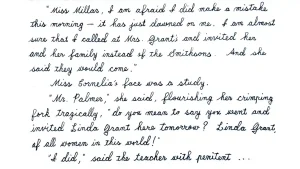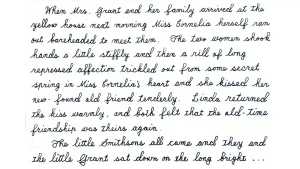災い転じて福となす#16『クリスマスの間違い』
A Christmas Mistake(対訳・英語勉強中)
Miss Cornelia did think—to good purpose evidently, for her forehead smoothed out as her meditations proceeded and her face brightened.
A Christmas Mistake
ミス・コーネリアは思案して、おそらく良い案を思いついたようでした。熟考していた彼女の表情が明るくなり、額のシワが取れたのです。
Then she got up briskly.
A Christmas Mistake
それから、彼女は元気に立ち上がりました。
"Well, you've done it and no mistake.
A Christmas Mistake
「よろしい。あなたはしくじりました。間違いなく」
I don't know that I'm sorry, either.
A Christmas Mistake
「私も悪かったのかもしれません」
Anyhow, we'll leave it as it is.
A Christmas Mistake
「とにかく、それはそれとして置いておきましょう」
But you must go straight down now and invite the Smithsons too.
A Christmas Mistake
「しかし、あなたは今すぐにスミスソン家にも行って招待しなければいけませんよ」
And for pity's sake, don't make any more mistakes."
A Christmas Mistake
「それと、お願いですから、これ以上間違えないでくださいね」
When he had gone Miss Cornelia opened her heart to Hannah.
A Christmas Mistake
彼が出かけると、ミス・コーネリアがハンナに打ち明けました。
"I never could have done it myself—never; the Turner is too strong in me.
A Christmas Mistake
「私は、自分から誘うことはできませんでした。決して。私の中のターナーの血が強すぎて」
But I'm glad it is done.
A Christmas Mistake
「でも、結果的に嬉しく思います」
I've been wanting for years to make up with Linda.
A Christmas Mistake
「私は何年もリンダと仲直りしたいと思っていました」
And now the chance has come, thanks to that blessed blundering boy, I mean to make the most of it.
A Christmas Mistake
「そして今、その機会が巡ってきました。あの大失敗した少年のおかげで。その機会を最大限利用するつもりです」
Mind, Hannah, you never whisper a word about its being a mistake.
A Christmas Mistake
「でもね、ハンナ、それが間違いだったことを決して言わないでくださいね」
Linda must never know.
A Christmas Mistake
「リンダは知らないはずだから」
Poor Linda! She's had a hard time.
A Christmas Mistake
「かわいそうなリンダ!彼女は辛い目にあっています」
Hannah, we must make some more pies, and I must go straight down to the store and get some more Santa Claus stuff; I've only got enough to go around the Smithsons."
A Christmas Mistake
「ハンナ、もう少しパイを作らないと。私は店に行ってサンタクロースのものを買ってきます。スミスソン家の分しか用意がありません」
Reference : Short Stories by L. M. Montgomery(project gutenberg)
English – Japanese parallel text, handwriting-based foreign language learning


